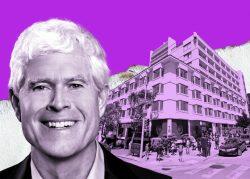Three meals a day prepared from Michelin-rated chefs. Chauffeured town cars and a Mercedes Sprinter van. And of course medical facilities, a movie theater, yoga studios, rooftop gardens, heated pools and salons.
San Francisco’s latest senior housing project won’t come cheap. Coterie Cathedral Hill will seek monthly rents as high as $27,000 per month, or $324,000 a year, according to the San Francisco Chronicle. The 208 units, ranging from studios to one and two bedrooms, start at $8,000 a month.
Coterie is a venture between Related and Atria Senior Living, a senior housing development company that will open its first two properties in San Francisco and New York City, the San Francisco Chronicle reported. The West Coast project, at 1001 Van Ness Avenue, is expected to open in March 2022. A second location, in Manhattan’s Hudson Yards, is set to open in late 2022.
Read more

Residents can eat in the communal formal dining room or get deliveries to their rooms. The building will also feature casual sitting areas, a cafe and a bar with a full liquor license.
Coterie will also be outfitted with on-site private health care facilities that will have treatment and diagnostic capabilities as well as fitness centers curated by the Mayo Clinic. Tailored nutrition and diet plans will also be available.
Atria CEO John Moore said Coterie was inspired by a similar property it owns in Manhattan that has a long waiting list. Some older people don’t want to give up city living to become residents of a suburb or a warmer climate, where senior housing is more commonly built, he said.
“There are sophisticated urban seniors who would prefer to stay in their hometowns,” he told the Chronicle. “And there are not a lot of options if their hometowns happen to be the big 24-hour cities like San Francisco, Manhattan or Los Angeles.”
[SFC] — Victoria Pruitt
